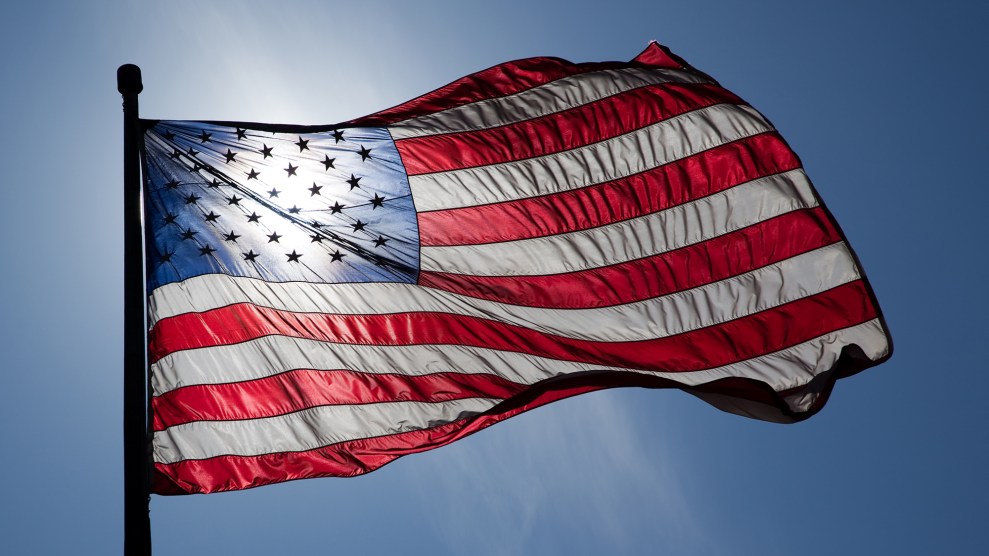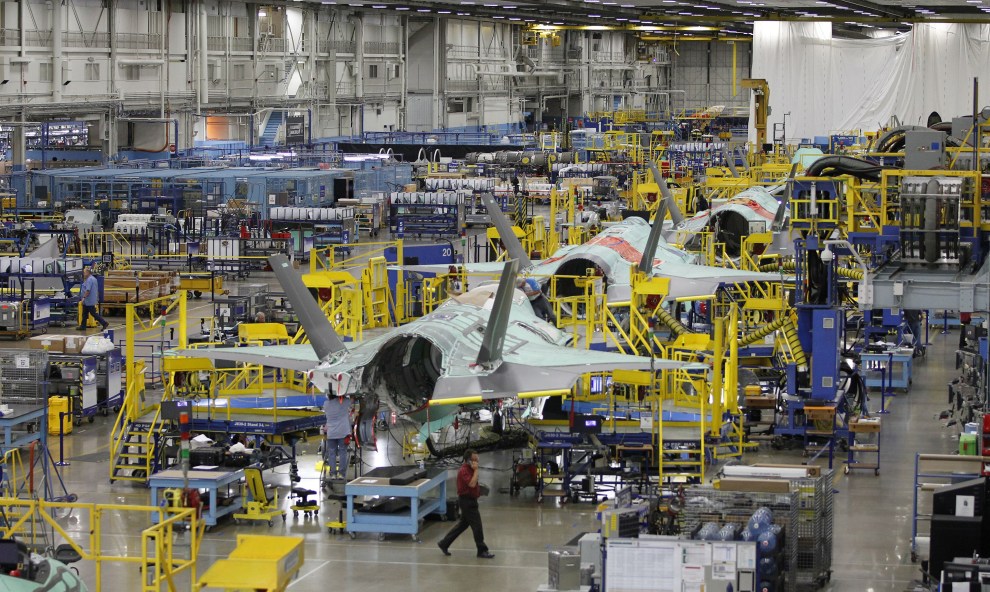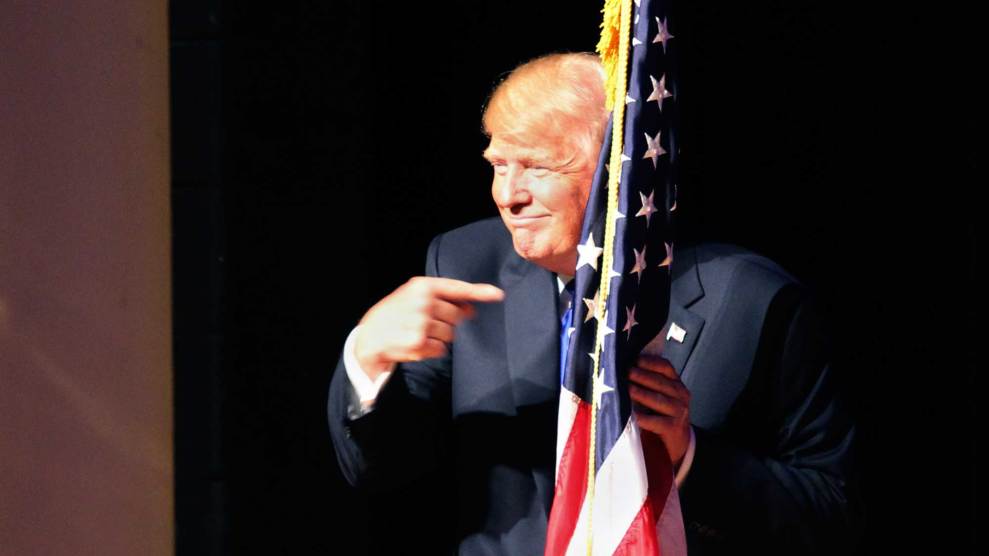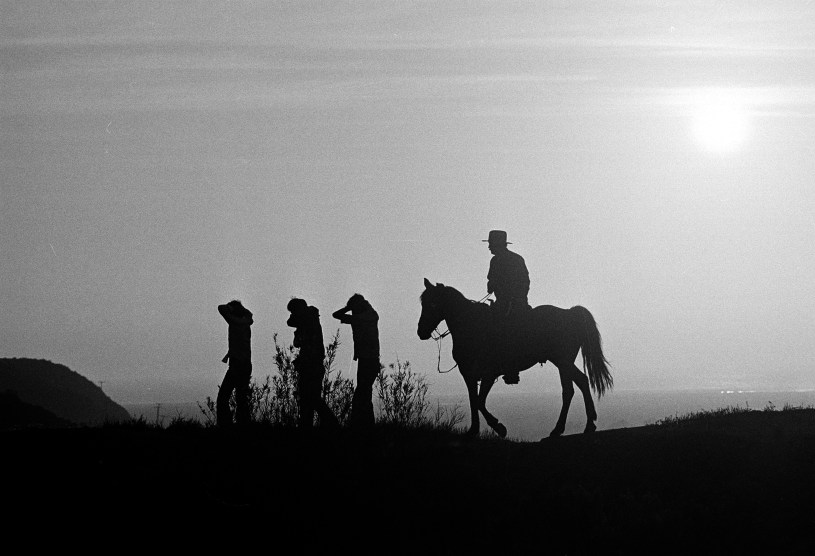
<a href="https://www.flickr.com/photos/54637956@N02/">jnn1776</a>/Flickr
This story first appeared on the TomDispatch website.
The fluorescent circus of Election 2016—that spectacle of yellow comb-overs and orange skin and predatory pussy-grabbing and last-minute FBI interventions and blinking memes hewn by an underground army of self-important internet trolls—has finally come to its unnatural end. I had looked forward to this moment, only to find us all instantly embroiled in a new crisis. And unfortunately, it’s easy to foretell what, or rather who, will move into the bright lights of our collective gaze now: Americans are going to continue to focus on…well, ourselves.
We are obviously not, for instance, going to redeploy our energies toward examining the embarrassing war that we’re still waging in Afghanistan, now in its 16th year—something that went practically unmentioned during election season even as fighting heated up there. (You can be sure that Afghans have a somewhat different perspective on the newsworthiness of that war.) We are also not going to spend our time searching for the names of people like Momina Bibi, whom we’ve—oops—inadvertently annihilated while carrying out our nation’s drone program.
For his part, Donald Trump has pledged to “take out” the families of terrorists, a plan that sounds practically ordinary when compared to our actual drone assassination program, conceived by President George W. Bush and maintained and expanded by President Barack Obama. And while I don’t for a moment pretend that Trump’s electoral victory is anything less than an emergency for our republic—especially for the most vulnerable among us, and for every American who believes in justice, equity, or basic kindness—it’s also true that some things won’t change at all.
In fact, it’s prototypically American that an overlong and inward-looking election spectacle (which will, incidentally, have “big-league” international implications) will be supplanted by still more inward-looking. And this jogs my memory in a not-very-pleasant way. I can’t help but recall the moment, years ago and 8,000 miles away, when I was introduced to my own American-centered self. The experience left an ugly mark on my picture of who I am—and who, perhaps, so many of us are, as Americans.
Eight years before I heard about a guy in Yemen whose cousins were obliterated by an American drone strike in a procession following his wedding celebration, I gleefully clicked through the travel site Kayak and pressed “confirm purchase” on a one-way ticket to Kathmandu. This was 2008, shortly before Barack Obama was elected, and my boyfriend and I—a couple of twentysomethings jonesing to see the world—were about to depart on what we expected to be the adventure of our lives. Having worked temporary stints and squirreled away some cash, we stashed our belongings into my mom’s damp basement and prepared for a journey meant to last half a year and span South Asia and East Africa. What we didn’t know as we headed for New York City’s Kennedy Airport, passports zippered into our money belts, was that, whatever we’d left behind at my mom’s, we were unwittingly carrying something far heftier with us: our American-ness.
Adventures commenced as soon as we stepped off the plane. We glimpsed ice-capped peaks that rose majestically out of the clouds as we walked the lower Everest trail. And then—consider this our introduction to the presumptions we hadn’t shed—we ran into a little snafu. We hadn’t brought along enough cash for our multiweek mountain trek—apparently we’d expected Capital One ATMs to appear miraculously on a Himalayan footpath.
After we dealt with that issue through a service that worked by landline and carbon paper, we took a bumpy Jeep ride south to India and soon found ourselves walking the sloping fields of Darjeeling, the leaves of tea shrubs glinting in the afternoon light. Then we rode trains west and south, while through the frame of a moving window I looked out at fields and rice paddies where women in red or orange or turquoise saris worked the land, even as the sun set and the sky turned pink and reflected off the water where the rice grew.
Things would soon get significantly less picturesque—and in some strange and twisted way, the farther we traveled, the closer to home we seemed to get.
We arrived in Mombasa, Kenya, in January 2009, on a day when thousands of people had flooded into the streets to protest a recent and particularly bloody Israeli attack on Gaza. Hamas, firing rockets into southern Israel, had killed one Israeli and injured many others. Israel retaliated in an overwhelming fashion, filling the Gazan sky with aircraft and killing hundreds of Palestinians, including five girls from a single family, ages four to 17, who were unlucky enough to live in a refugee camp adjacent to a mosque that an Israeli plane had leveled.
As I hopped off the matatu, or passenger van, into the scorching Kenyan heat, I was aware that 50,000 angry protesters had gathered not so far away, and certain facts became clear to me. For one thing, the slaughter of hundreds of civilians, including several dozen children, in what was to me a faraway land, was a big effing deal here. That should probably go without saying just about anywhere—except I was suddenly aware that, were I home, the opposite would have been true. Those deaths in distant Gaza (unlike nearby Israel) would barely have caused a blip in the American news. What’s more, if I had been at home and the story had somehow caught my eye, I knew that I wouldn’t have paid it much mind. Another war in a foreign country is what I would’ve thought, and that would have been that.
At that moment, though, I didn’t dwell on the point because—let’s be serious—I was scared poopless. There was a huge, angry protest nearby and we’d just gotten word that the crowd was burning an American flag. Israel, it turned out, had used a new US-made missile in its assault. According to the Jerusalem Post, it was a weapon designed to minimize “collateral damage.” (Tell that to the families of the dead.) The enraged people who had taken to the streets in Mombasa were decrying my country’s role in the carnage—and I was a skinny American with a backpack who’d arrived in the wrong city on the wrong day.
We got the hell out of there as soon as we could. Early the next morning we climbed aboard a rusty old bus bound for Dar es Salaam, Tanzania. I felt a wave of relief once I’d settled into my seat. I was looking forward to a different country and a new vista.
That new vista, it turned out, materialized almost at once. Our bus was soon barreling along a rutted dirt road, the scenery whipping by the window in a distinctly less-than-picturesque fashion. In fact, it passed in such a blur that I realized we were going way too fast. We already knew that bus accidents were common here; we’d heard about a recent one in which all the passengers died.
When we hit what undoubtedly was a yawning pothole on that none-too-well kept road, the windows shook ominously and I thought: we could die. By then, my slick hands were gripping my shredded vinyl seat. I could practically feel the heat of the crash-induced flames and had no trouble picturing our charred bodies in the wreckage of the bus. And then that other thought came to me, the one I wouldn’t forget, the one, thousands of miles from home, that seemed to catch who I really was: No not us, we can’t die! was what I said to myself, pressing my eyes shut. I meant, of course, my boyfriend and I. I meant, that is, we Americans.
It was then that I felt an electric zap, as the events of the previous day had just melded with the present dangers and forced me to see what I would have preferred to ignore: that there was an unsavory likeness between my outlook and the American credo that thousands had been protesting in Mombasa. We can’t die, was my thought, as if we were somehow different—as if these Africans on the bus with us could die, but not us. Or, just as easily, those Palestinians could die—and thanks to US-supplied arms, no less—and I wouldn’t even tune in for the story. Clutching my torn bus seat, I was still afraid, but another sensation overwhelmed me. I felt like a colossal jerk.
Of course, as you know because you’re reading this, we made it safely to Dar es Salaam that night. But I was changed.
I’d like to say that my egocentricity about which lives matter most is uncommon among my countrymen and women. But if you spool through the seven-plus years since I rode that bus, you’ll notice how that very same mindset has meant that Americans go wild with panic over lone wolf terror killings on our soil, but show scant concern when it comes to the White House-directed, CIA-run drone assassination campaigns across the world, and all the civilian casualties that are the bloody result.
The dead innocents include members of a Yemeni family who were riding in a wedding procession when four missiles bore down on them, and Momina Bibi, that Pakistani grandmother who was tending to an okra patch as her grandchildren played nearby when a missile blasted her to smithereens. And don’t forget the 42 staff members, patients, and relatives at a Médecins Sans Frontières hospital in Kunduz, Afghanistan, killed in an attack by a US AC-130 gunship. Depending on which tally you use, since 2009 we’ve killed an estimated 474 civilians, or perhaps 745, outside of official war zones—and far more civilians, like those dead in that hospital, within those zones. The horrifying truth is that the real numbers are likely much higher, but unknown and unknowable.
Meanwhile, duh, we would never fire a missile at a suspected terrorist if innocent US civilians were identified in the vicinity. We value American life far too highly for such wantonness. In 2015, when a drone struck an al-Qaeda compound in Pakistan, it was later discovered that two hostages, one of them an American, were inside. In response, President Obama delivered grave remarks: “I offer our deepest apologies to the families…I directed that this operation be declassified and disclosed… because the families deserve to know the truth.”
But why so sorry that time and not with the other 474 or more deaths? Of course, the difference was that innocent American blood was spilt. We don’t even try to hide this dubious hierarchy; we celebrate it. In that same speech, President Obama reflected on why we Americans are so darn special. “One of the things that makes us exceptional,” he declared, “is our willingness to confront squarely our imperfections and to learn from our mistakes.”
If you hailed from any other country, it might have seemed like an odd, not to say tasteless, time to wax poetic about American exceptionalism. The president was, after all, confessing that we’d accidentally fired missiles at two captive aid workers. But I can appreciate the sentiment. Inadequate though the apology was—”There are hundreds, potentially thousands of others who deserve the same apology,” said an investigator for Amnesty International—Obama was at least admitting that the United States had erred, and he was pointing out that such admissions are important. Indeed, they are. It’s just…what about the rest of the people on the planet?
The Trump administration will probably espouse a philosophy much like President Obama’s when it comes to valuing (or not) the lives of foreign innocents. And yet there’s part of me that must be as unworldly as that twenty-something who flew into Kathmandu, because I find myself dreaming about a new brand of American exceptionalism. Not one that gives you that icky feeling when you’re riding a speeding bus in another hemisphere, nor one at whose heart lies the idea that we Americans are different and special and better—which, history tells us, is actually a totally unexceptional notion among powerful nations. Instead, I imagine what would be truly exceptional: an America that values all human life in the same way.
Of course, I’m also a realist and I know that that’s not the world we live in, especially now—and that it won’t be, for, at best, a very long time.
Mattea Kramer is at work on a memoir called The Young Person’s Guide to Aging, which inspired this essay. Follow her on Twitter.










